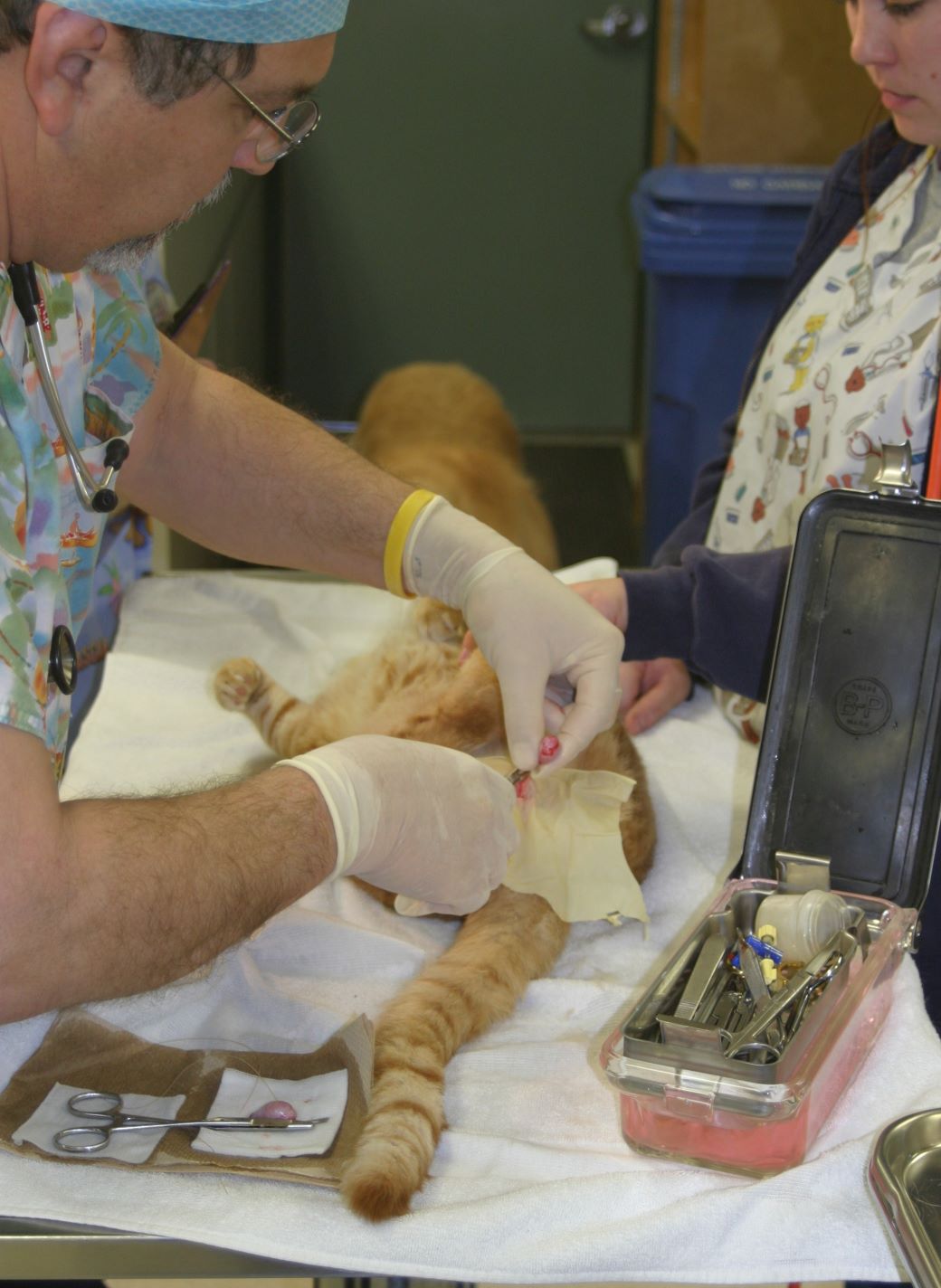Calif. bill would allow veterinary technicians to neuter cats
 Listen to this story.
Listen to this story.
cat neuter

VIN photo
Veterinary technician students assist a veterinarian during a cat neuter surgery at Cosumnes River College in Sacramento in 2006. Lawmakers in California will soon consider whether to allow registered veterinary technicians to perform the surgery under the direct supervision of a veterinarian.
A bill introduced into the California Legislature Wednesday would permit a registered veterinary technician to neuter a male domestic cat provided they're directly supervised by a veterinarian.
If passed, the measure would make California the only state to allow veterinary technicians to perform the surgery on cats, according to the American Veterinary Medical Association.
Supporters of the bill say it is one among several steps needed to address the apparent shortage of veterinarians and combat a "pet overpopulation crisis" in the state. Opponents say the change would put cats at risk and set a dangerous precedent in the practice of veterinary medicine.
The bill is sponsored by Social Compassion in Legislation (SCIL), an animal welfare organization focusing on public policy.
"We cannot fix the shortage of veterinarians overnight," SCIL founder and president Judie Mancuso said in a press release announcing the legislation. "This is a long-term problem that must be tackled from multiple angles over time. But right now, we have a pet overpopulation crisis. By expanding the duties of RVTs, this bill will increase the capacity of DVMs to complete more complicated spay and neuter surgeries."
The California RVT Association is also on the record as an early supporter of the bill.
Meanwhile, the AVMA and California Veterinary Medical Association quickly have voiced their strong opposition to the measure.
"[O]nly a licensed veterinarian has the education and training necessary to safely perform surgeries on pets and address any associated issues that may arise when performing these surgeries," AVMA president Dr. Rena Carlson said in a statement provided to the VIN News Service yesterday.
In defining veterinarians' scope of practice, state practice acts say that veterinarians alone are permitted to perform surgery.
"[The bill] is scope-of-practice creep that the sponsors are trying to advance under the access-to-care banner," said Dr. Grant Miller, CVMA director of regulatory affairs. "The immediate harm could be to animals. The greater harm is in the concept that an advanced task such as this could be learned on the job."
Education required to obtain a license as a veterinary technician does not include surgery. It does include anesthesia, dental extractions and suturing, and RVTs are allowed to perform these tasks in California. The bill makes no provision for additional education, so surgery training would conceivably happen on the job.
"We understand that auxiliary health tasks are learned on the job," Miller said. "But surgery is not an auxiliary health care task. Surgery is the opposite. It represents the most advanced level of veterinary practice."
This bill could be heard at a meeting of the Assembly Business and Professions Committee as early as March 8.
What would change in California?
AB 2133 would amend California Business and Professions Code 4840 to allow technicians to neuter a cat under direct supervision of the veterinarian so long as the RVT "reviews the animal patient's history in order to reasonably ensure that the neuter surgery is appropriate" and the surgery is performed "in accordance with written protocols and procedures established by the veterinarian."
Direct supervision means the veterinarian has examined the patient prior to the procedure, and they are on the premises when the procedure is performed.
Nancy Erhlich, an RVT and a regulatory and legislative advocate for the California RVT Association, describes the arrangement as a win-win-win. "Veterinarians will benefit by being able to use their time more productively, RVTs will have incentive to increase their skillset for career advancement, and clients will benefit by being able to have their cats neutered in a timely and cost-effective manner," she was quoted as saying in the bill announcement.
She also said veterinarians would be responsible for ensuring that RVTs have the necessary skills and guidance to perform the procedure.
In a standard cat castration, an incision is made to the scrotum over each testicle, the testicles are removed and the spermatic cord is tied off.
CVMA's Miller said that surgery is not simply about what happens when things go right. It's also about when things go wrong.
"Problems with surgery are immediate," he said. "If you have a bleeder, you need to know how to open the abdomen to find the bleeding vessel and stop it. You need to know how to do a blood transfusion. And you need to have the authority to diagnose and prescribe for those conditions. [RVTs] do not have that."
A question that arises in many conversations about expanding the scope of practice for veterinary technicians is: Whose license is on the line if something goes wrong while a technician is doing a procedure?
Mancuso, who served for eight years on the California Veterinary Medical Board, where she deliberated over hundreds of disciplinary cases, said, "Depending on the circumstances, the license of the supervising veterinarian or registered veterinary technician or the premise permit could be involved," she said. "But I would note that it is the general consensus in the industry that a cat neuter is a simpler procedure than other tasks already carried out by RVTs. And in my years, I have no recollection of any disciplinary case that involved [male] cat neuters, only spays."
AVMA's Carlson maintains that evidence shows things can go wrong even with common surgeries such as castrations. "Complications from spays, neuters and anesthesia are among the top causes for insurance claims," she said. "It makes no sense to allow anyone other than a veterinarian to perform surgery on pets."
UK veterinarians lean in the opposite direction
Moves in the United Kingdom to allow veterinary nurses — a position broadly equivalent to technicians in the United States — to perform cat castrations have gained traction, although proposed changes have yet to be implemented, following an initial burst of activity.
In 2021, the Royal College of Veterinary Surgeons, the country's chief regulator of the profession, approved a series of changes to U.K. law that would allow veterinary nurses to perform cat castrations "under veterinary direction and supervision." The changes also would allow veterinary nurses to "play a greater role" in anesthesia and prescribe some medications.
The British Veterinary Association, which represents more than 19,000 veterinarians, was involved in the consultation process and signed off on the proposed changes to the Veterinary Surgeons Act 1966.
The RCVS has since formally submitted its recommendations to the U.K. government and, on its website, says, "[W]e continue to engage with stakeholders on the need for this reform." The government, though, has yet to prepare new legislation and allocate time for a parliamentary vote on the changes.
Veterinary nurses in the U.K. once were allowed to neuter male cats, but that ended in 1988, when the law was amended to prohibit "untrained laypeople," including farmers, from carrying out numerous procedures with the intent of protecting animal welfare.
Cat castration remains out of bounds, in part because the legislation states that non-veterinarians can't perform procedures involving "entry into a body cavity." In 1998, after much debate, the RCVS clarified that the scrotum of a cat is a body cavity.
The RCVS has since embraced the idea of cat castrations being performed by veterinary nurses. A working group formed by the RCVS to consider rule changes described nurses in 2020 as "fully fledged" professionals, and made its recommendation to change the rules, "notwithstanding the debatable question of whether castration is 'entry into a body cavity.' "
Ross Kelly contributed to this report.